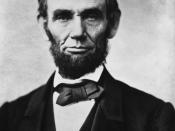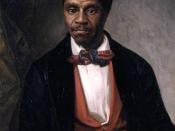1) Compromise of 1850 : It's a series of compromises passed by United States congress in order to settle slavery issues. It was used to balance pro and anti slave states. (36 -30)
2)
3) John Calhoun: (1782-1850) Political leader who was United States congressman, Secretary of war, Vice President (1825-1832) senator and secretary of state. He supported states rights and slavery. He was a symbol of the old south. He also fought for the protection of the south which contributed to the Civil War
3) Henry Clay: (1777-1852) Statesman. Leader of the wing party. Clay played a central role on the stage of national politics for over forty years. He was a nationalist, devoted to the economic development and political integration of the United States.
4) Daniel Webster: Practice as a lawyer before the United States supreme court and serve as a United States congressman (1813-1817, 1823-1827).
United States senator (1827-1841,1845-1850) and United States secretary of State (1841-1843, 1850-1852). He urged both the North and the South to avoid extreme positions on slavery.
5) Fugitive Slave Law: It created special commissioners to deal with the fugitive slave cases. Commissioners had to convict slaves of being a fugitive before granting owners authority to seize the runaway. This contributed to the Civil War in the way that it put slave owners at great personal expense and failure to provide for assistance from federal officers.
6) Dred Scott Decision: Denied both to right of a slave to sue for freedom and the right of a territory to exclude slavery within it's boundaries. This contributed to the outbreak of the Civil War in the way that it inflamed antislavery factions by denying a slave of any rights.
7) Roger Taney: Fifth Chief of Justice of the Supreme Court of the United...


